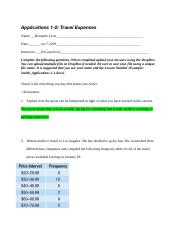Imagine yourself standing at the departure gate, boarding pass in hand, ready to embark on an exciting adventure. The anticipation is palpable, but a nagging question lingers in the back of your mind: how much will this trip really cost? We all dream of exploring new horizons, but the reality is, travel can be expensive. This is where financial algebra steps in, providing a framework to help us understand, manage, and ultimately conquer the complexities of travel expenses.

Image: www.coursehero.com
Financial algebra, at its core, is a practical tool that helps us analyze and solve real-world financial situations. In the context of travel, it allows us to break down the cost of a trip into its individual components and calculate the overall financial impact. Whether you’re planning a weekend getaway or a round-the-world adventure, a robust understanding of your travel expenses is paramount to a successful and financially responsible journey.

Image: www.chegg.com
1 2 Travel Expenses Financial Algebra Answers
Demystifying the Formula: A Step-by-Step Breakdown
The “1 2 travel expenses” formula, often encountered in financial algebra textbooks, is a simplified representation of the key categories of travel costs. Let’s break down this concept and explore its application in real-world travel planning:
1. Transportation: This category represents the cost of getting to and from your destination. This can encompass a wide range of options, including:
- Airfare: The single largest expense for most long-distance trips. Factors influencing airfare include the distance traveled, the time of year, and the airline.
- Train Tickets: A cost-effective and often scenic alternative to flying, particularly for shorter distances and within Europe.
- Bus Tickets: A budget-friendly option for covering ground efficiently, particularly in regions with well-developed public transportation systems.
- Rental Cars: Offer flexibility and convenience to explore destinations at your own pace, but can add to your overall travel costs.
- Fuel Costs: If you’re driving, factoring in fuel costs is crucial for accurate budgeting.
2. Accommodation: This category includes the cost of your lodging while away from home. Here’s a breakdown of various options:
- Hotels: Offer a range of amenities and services, from basic rooms to luxurious suites. Prices vary depending on location, star rating, and seasonality.
- Vacation Rentals: Can be a more affordable alternative, offering kitchen facilities and often a more spacious, home-like experience. Popular platforms include Airbnb and Vrbo.
- Hostels: A budget-friendly option for solo travelers or groups, providing basic accommodations with shared facilities.
3. Food and Beverages: This category encompasses the cost of meals, snacks, and drinks while away from home.
- Restaurants: Dining out can be a significant expense, particularly in tourist areas or major cities.
- Groceries: Preparing your meals can be a cost-effective way to manage food expenses, especially for longer trips.
4. Activities and Entertainment: This category encompasses any money spent on experiences, attractions, or leisure activities while traveling.
- Touring and Sightseeing: This could include entrance fees to museums, historical sites, and other attractions.
- Entertainment: This could range from concerts and shows to cinema tickets and nightlife.
5. Miscellaneous Expenses: This category encompasses any unforeseen costs that can arise during travel.
- Souvenirs and Gifts: A reminder of your travels that can add up quickly.
- Laundry and Cleaning: If you’re traveling for an extended period, factor in the cost of keeping your belongings clean and tidy.
- Tips and Gratuities: A common part of travel etiquette in many countries.
- Emergency Funds: It’s wise to set aside a small buffer for unexpected situations, such as medical emergencies or flight delays.
Financial Algebra in Action: A Practical Example
Let’s illustrate how financial algebra can be used to plan for a typical weekend getaway:
Scenario: You’re planning a three-day trip to a nearby city, including a flight, hotel, and some sightseeing activities.
1. Set a Budget: Decide how much you can comfortably afford to spend on your trip.
2. Research and Estimate Expenses:
- Airfare: Check airline websites and consider budget airlines for affordable options.
- Hotel: Explore hotel booking sites for deals and compare prices for different options.
- Food: Factor in the cost of meals and snacks, considering options like grocery shopping for some meals.
- Activities: Research attractions and calculate the cost of entrance fees and any other activities you plan to enjoy.
3. Use a Spreadsheet or Financial App: Create a simple spreadsheet or use a dedicated travel budgeting app to organize your estimated expenses.
4. Make Adjustments: Keep your budget flexible and be prepared to make adjustments if necessary.
Expert Insights and Actionable Tips
1. Master the Art of Budgeting: Planning your expenses in advance is crucial to ensure a financially stress-free trip. Use tools like budgeting apps or spreadsheets to track your spending and make informed decisions.
2. EmbraceFlexibility and Adapt to Changing Circumstances: Travel often throws curveballs, so be prepared to adjust your plans and adapt to unforeseen circumstances. Always factor in some buffer for unexpected expenses.
3. Consider Alternate Transportation Options: If airfare is prohibitively expensive, explore alternatives like trains or buses. These options can be more budget-friendly and often offer scenic routes.
4. Maximize Travel Rewards Programs: Take advantage of credit card rewards programs or airline loyalty programs to earn points and miles that can be redeemed for future travel.
5. Be Aware of Hidden Costs: Be on the lookout for hidden fees, such as baggage charges, airport parking, or international roaming charges.
Conclusion:
Mastering financial algebra when it comes to travel expenses can empower you to plan trips that align with your financial goals. By effectively budgeting, using financial tools, and embracing a flexible approach, you can turn your travel dreams into reality while still maintaining a responsible and sustainable travel budget. So, go ahead, explore the world, and let financial algebra be your compass on this exciting journey.






